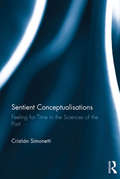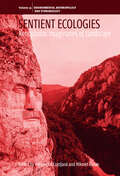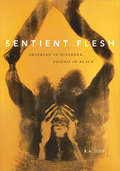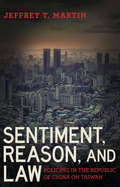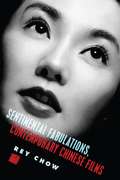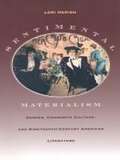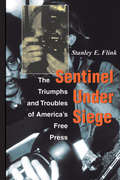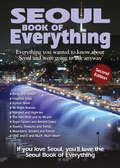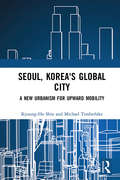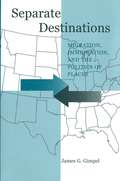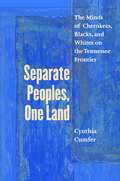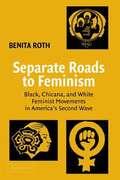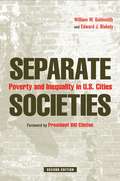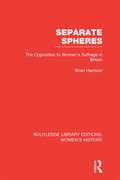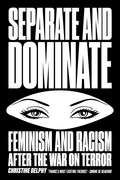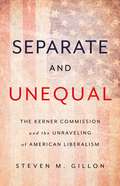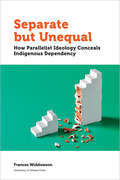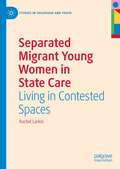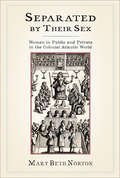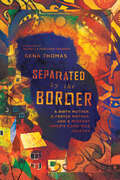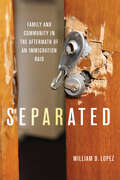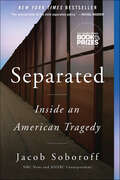- Table View
- List View
Sentient Conceptualisations: Feeling for Time in the Sciences of the Past
by Cristian SimonettiSentient Conceptualisations is about how scientists studying the past understand time in relation to space. Simonetti argues that the feelings for depths and surfaces, arising from the bodily movements and gestures of scientific practice, strongly influence conceptualisations of space and time. With an anthropological eye, Simonetti explores the ways archaeologists and those from related disciplines develop expert knowledge in varied environments. The book draws on ethnographic work carried out with Chilean and Scottish archaeologists, working both on land and underwater, to analyse in depth the visual language of science and what it reveals about the relation between thinking and feeling.
Sentient Ecologies: Xenophobic Imaginaries of Landscape (Environmental Anthropology and Ethnobiology #31)
by Alexandra Coțofană Hikmet KuranEmploying methodological perspectives from the fields of political geography, environmental studies, anthropology, and their cognate disciplines, this volume explores alternative logics of sentient landscapes as racist, xenophobic, and right-wing. While the field of sentient landscapes has gained critical attention, the literature rarely seems to question the intentionality of sentient landscapes, which are often romanticized as pure, good, and just, and perceived as protectors of those who are powerless, indigenous, and colonized. The book takes a new stance on sentient landscapes with the intention of dispelling the denial of “coevalness” represented by their scholarly romanticization.
Sentient Flesh: Thinking in Disorder, Poiesis in Black (Black Outdoors: Innovations in the Poetics of Study)
by R. A. JudyIn Sentient Flesh R. A. Judy takes up freedman Tom Windham’s 1937 remark “we should have our liberty 'cause . . . us is human flesh" as a point of departure for an extended meditation on questions of the human, epistemology, and the historical ways in which the black being is understood. Drawing on numerous fields, from literary theory and musicology, to political theory and phenomenology, as well as Greek and Arabic philosophy, Judy engages literary texts and performative practices such as music and dance that express knowledge and conceptions of humanity appositional to those grounding modern racialized capitalism. Operating as critiques of Western humanism, these practices and modes of being-in-the-world—which he theorizes as “thinking in disorder,” or “poiēsis in black”—foreground the irreducible concomitance of flesh, thinking, and personhood. As Judy demonstrates, recognizing this concomitance is central to finding a way past the destructive force of ontology that still holds us in thrall. Erudite and capacious, Sentient Flesh offers a major intervention in the black study of life.
Sentiment, Reason, and Law: Policing in the Republic of China on Taiwan (Police/Worlds: Studies in Security, Crime, and Governance)
by Jeffrey T. MartinWhat if the job of police was to cultivate the political will of a community to live with itself (rather than enforce law, keep order, or fight crime)? In Sentiment, Reason, and Law, Jeffrey T. Martin describes a world where that is the case.The Republic of China on Taiwan spent nearly four decades as a single-party state under dictatorial rule (1949–1987) before transitioning to liberal democracy. Here, Martin describes the social life of a neighborhood police station during the first rotation in executive power following the democratic transition. He shows an apparent paradox of how a strong democratic order was built on a foundation of weak police powers, and demonstrates how that was made possible by the continuity of an illiberal idea of policing. His conclusion from this paradox is that the purpose of the police was to cultivate the political will of the community rather than enforce laws and keep order.As Sentiment, Reason, and Law shows, the police force in Taiwan exists as an "anthropological fact," bringing an order of reality that is always, simultaneously and inseparably, meaningful and material. Martin unveils the power of this fact, demonstrating how the politics of sentiment that took shape under autocratic rule continued to operate in everyday policing in the early phase of the democratic transformation, even as a more democratic mode of public reason and the ultimate power of legal right were becoming more significant.
Sentimental Fabulations, Contemporary Chinese Films: Attachment in the Age of Global Visibility (Film and Culture Series)
by Rey ChowWhat is the sentimental? How can we understand it by way of the visual and narrative modes of signification specific to cinema and through the manners of social interaction and collective imagining specific to a particular culture in transition? What can the sentimental tell us about the precarious foundations of human coexistence in this age of globalization? Rey Chow explores these questions through nine contemporary Chinese directors (Chen Kaige, Wong Kar-wai, Zhang Yimou, Ann Hui, Peter Chan, Wayne Wang, Ang Lee, Li Yang, and Tsai Ming-liang) whose accomplishments have become historic events in world cinema. Approaching their works from multiple perspectives, including the question of origins, nostalgia, the everyday, feminine "psychic interiority," commodification, biopolitics, migration, education, homosexuality, kinship, and incest, and concluding with an account of the Chinese films' epistemic affinity with the Hollywood blockbuster Brokeback Mountain, Chow proposes that the sentimental is a discursive constellation traversing affect, time, identity, and social mores, a constellation whose contours tends to morph under different historical circumstances and in different genres and media. In contemporary Chinese films, she argues, the sentimental consistently takes the form not of revolution but of compromise, not of radical departure but of moderation, endurance, and accommodation. By naming these films sentimental fabulations-screen artifacts of cultural becoming with irreducible aesthetic, conceptual, and speculative logics of their own-Chow presents Chinese cinema first and foremost as an invitation to the pleasures and challenges of critical thinking.
Sentimental Materialism: Gender, Commodity Culture, and Nineteenth-Century American Literature
by Lori MerishIn Sentimental Materialism Lori Merish considers the intricate relationship between consumption and womanhood in the late eighteenth and nineteenth centuries. Taking as her starting point a diversity of cultural artifacts--from domestic fiction and philosophical treatises to advice literature and cigars--Merish explores the symbolic functions they served and finds that consumption evolved into a form of personal expressiveness that indicated not only a woman's wealth and taste but also her race, class, morality, and civic values. The discursive production of this new subjectivity--the feminine consumer--was remarkably influential, helping to shape American capitalism, culture, and nation building.The phenomenon of female consumption was capitalism's complement to male production: It created what Merish calls the "Other Protestant Ethic,"a feminine and sentimental counterpart to Max Weber's ethic of hard work, economic rationality, and self-control. In addition, driven by the culture's effort to civilize the "cannibalistic" practices of ethnic, class, and national otherness, appropriate female consumerism, marked by taste and refinement, identified certain women and their families as proper citizens of the United States. The public nature of consumption, however, had curiously conflicting effects: While the achievement of cultured material circumstances facilitated women's civic agency, it also reinforced stereotypes of domestic womanhood.Sentimental Materialism's inquiry into middle-class consumption and accompanying ideals of womanhood will appeal to readers in a variety of disciplines, including American studies, cultural studies, feminist theory, and cultural history.
Sentiments of a British-American Woman: Esther DeBerdt Reed and the American Revolution
by Owen S. IrelandAt the time of her death in 1780, British-born Esther DeBerdt Reed—a name few know today—was one of the most politically important women in Revolutionary America. Her treatise “The Sentiments of an American Woman” articulated the aspirations of female patriots, and the Ladies Association of Philadelphia, which she founded, taught generations of women how to translate their political responsibilities into action. DeBerdt Reed’s social connections and political sophistication helped transform her husband, Joseph Reed, from a military leader into the president of the Supreme Executive Council of Pennsylvania, a position analogous to the modern office of governor.DeBerdt Reed’s life yields remarkable insight into the scope of women’s political influence in an age ruled by the strict social norms structured by religion and motherhood. The story of her courtship, marriage, and political career sheds light both on the private and political lives of women during the Revolution and on how society, religion, and gender interacted as a new nation struggled to build its own identity.Engaging, comprehensive, and built on primary source material that allows DeBerdt Reed’s own voice to shine, Owen Ireland’s expertly researched biography rightly places her in a prominent position in the pantheon of our founders, both female and male.
Sentinel Under Siege: The Triumphs And Troubles Of America's Free Press
by Stanley E FlinkIf the unexamined life is not worth living, surely the unexamined media is not worth heeding. Sentinel Under Siege traces the evolution of the media in the United States and its capacity to examine and regulate itself, from its earliest colonial roots to the modern explosion of digital technology.Once the Bill of Rights was enacted in 1791, the press became the first and only enterprise explicitly protected by the United States Constitution. This book is concerned with the legal content given to freedom of the press by the Supreme Court, and the fitful attempts of media criticism?both intramural and external?to build a greater sense of responsibility among the practitioners.Stanley Flink, former correspondent of Life Magazine and writer/producer at NBC and CBS, is concerned less with the people's right to know than with the people's need to know. Only a competent, responsible press?whatever its means of distribution?can perform the role of watchdog over official abuse of power, business corruption, and political distortions. But the acquisition of so many newspapers, magazines, and broadcasting facilities by corporate conglomerates threatens a new kind of prior restraint on an independent press?the conflicts of interest; the power of advertising; the unspoken self-censorship of reporters and editors, print or electronic, based on the perceived predilections of their employers; and the financial interests of related companies.Flink believes that responsible journalism can also be economically viable in the twenty-first century because the mass communication of reliable news reporting and media accountability will be vital to the democratic process. Unless the news media persistently seeks the high moral ground of public service, the first casualty will be an informed electorate. The second may well be constitutional protection.
Seoul Book of Everything: Everything You Wanted to Know About Seoul and Were Going to Ask Anyway (Book Of Everything Ser.)
by Tim LehnertYour key to the South Korean city&’s neighborhoods, green spaces, and urban design, as well as its history, museums, pop culture, shopping, and more. From ancient royal palaces and Korean traditional houses to all-night markets, N Seoul Tower, and the club scene, no city combines the ancient and the contemporary quite like Seoul. Local experts weigh in on one of the world&’s most dynamic cities, including contributions from Robert Neff, Tracey Stark, Daniel Gray, Kim Young-sook, Joel Levin, Michael J. Meyers, and Mary Crowe. A comedian details the five things you must bring to Korea, a food writer picks five favorite restaurants, and a prominent meteorologist provides the low-down on Seoul&’s climate. You&’ll also find insider takes on local mountains and ghosts, as well as movies, tea houses, night spots, the economy, cultural treasures, essential reads, Buddhist shrines, and Seoul&’s amazing postwar evolution. From the DMZ, the Han River, and Cheonggyecheon Stream to navigating local dining, linguistics, and cultural practices, this completely updated reference will become your go-to book on the &“Land of the Morning Calm.&”
Seoul, Korea's Global City: A New Urbanism for Upward Mobility
by Kyoung-Ho Shin Michael TimberlakeSeoul, as one of Asia’s rising global cities, has been a place where enormous changes in politics, industry, and culture have taken place over the last five decades. This book explores the new urbanism in Seoul from the perspective of global political economy, focusing on the contexts in which the city has witnessed the transformation of its population structure, such as the rise of the global urban middle class and the city’s increased nodal function in commodity chains. The burgeoning signs of Seoul’s status as a global city are discussed in terms of transnational tourism and the frequency of study abroad, the immigrant community, and cross-border cultural flows. Examining the labour structures within the city, economic growth policy, the role of advanced information technology, and neoliberal urban development, the authors also examine the local response in the city to its emerging status. A study of the development of the Korean capital and its deep embeddedness in the world economy, Seoul, Korea’s Global City will appeal to scholars of sociology, geography and economics with interests in political economy, urban studies and Asian studies.
Separate Beds: A History of Indian Hospitals in Canada, 1920s-1980s
by Maureen K. LuxSeparate Beds is the shocking story of Canada's system of segregated health care. Operated by the same bureaucracy that was expanding health care opportunities for most Canadians, the "Indian Hospitals" were underfunded, understaffed, overcrowded, and rife with coercion and medical experimentation. Established to keep the Aboriginal tuberculosis population isolated, they became a means of ensuring that other Canadians need not share access to modern hospitals with Aboriginal patients.Tracing the history of the system from its fragmentary origins to its gradual collapse, Maureen K. Lux describes the arbitrary and contradictory policies that governed the "Indian Hospitals," the experiences of patients and staff, and the vital grassroots activism that pressed the federal government to acknowledge its treaty obligations.A disturbing look at the dark side of the liberal welfare state, Separate Beds reveals a history of racism and negligence in health care for Canada's First Nations that should never be forgotten.
Separate Destinations
by James G. GimpelNatives who change residence do not settle in the same places as immigrants. Separate Destinationsargues that these distinct mobility patterns, coupled with record levels of immigration from impoverished third world nations, are balkanizing the American electorate. James G. Gimpel examines the consequences of different patterns of movement and settlement on the politics of the communities in which these different groups settle. Newer immigrants are con-strained by a lack of education, money, English literacy, and information--and frequently by discrimination--to live in areas of coethnic settlement. Domestic, native-born migrants--predominantly Caucasian--free of discrimination and possessing more money and information, move where they wish, often to communities where immigrants are not welcome or cannot afford to live. Strong evidence suggests that spatially isolated immigrants are slower to naturalize and get involved in politics than domestic migrants. Gimpel looks closely at states with very different patterns of migration and immigration: California, Colorado, Kansas, Kentucky, Florida, Pennsylvania, and New York. In these states, Gimpel shows the impact of population mobility on party registration, party votes, and voter turnout and asks whether population changes have changed the dominant party in a state or produced a political reaction from natives. Separate Destinationscontains a number of thematic maps detailing the settlement patterns of internal migrants and immigrants for both counties and census tracts. Blending insights from a number of social science disciplines, including economics, demography, sociology, political science, and anthropology, this book will be of interest to a wide and diverse readership of scholars, students, and policymakers. James G. Gimpel is Associate Professor of Government, University of Maryland.
Separate Peoples, One Land
by Cynthia CumferExploring the mental worlds of the major groups interacting in a borderland setting, Cynthia Cumfer offers a broad, multiracial intellectual and cultural history of the Tennessee frontier in the Revolutionary and early national periods, leading up to the era of rapid westward expansion and Cherokee removal. Attentive to the complexities of race, gender, class, and spirituality, Cumfer offers a rare glimpse into the cultural logic of Native American, African American, and Euro-American men and women as contact with one another powerfully transformed their ideas about themselves and the territory they came to share. The Tennessee frontier shaped both Cherokee and white assumptions about diplomacy and nationhood. After contact, both groups moved away from local and personal notions about polity to embrace nationhood. Excluded from the nationalization process, slaves revived and modified African and American premises about patronage and community, while free blacks fashioned an African American doctrine of freedom that was both communal and individual. Paying particular attention to the influence of older European concepts of civilization, Cumfer shows how Tennesseans, along with other Americans and Europeans, modified European assumptions to contribute to a discourse about civilization, one both dynamic and destructive, which has profoundly shaped world history.
Separate Roads To Feminism: Black, Chicana, And White Feminist Movements In America's Second Wave
by Benita RothThis book is about the development of white women's liberation, black feminism and Chicana feminism in the 1960s and 1970s, the era known as the "second wave" of U. S. feminist protest. Benita Roth explores the ways that feminist movements emerged from the Civil Rights/Black Liberation movement, the Chicano movement, and the white left, and the processes that supported political organizing decisions made by feminists. She traces the effects that inequality had on the possibilities for feminist unity and explores how ideas common to the left influenced feminist organizing.
Separate Schools: Gender, Policy, and Practice in Postwar Soviet Education (NIU Series in Slavic, East European, and Eurasian Studies)
by E. Thomas EwingStarting in 1943, millions of children were separated into boysÆ and girlsÆ schools in cities across the Soviet Union. The government sought to reinforce gender roles in a wartime context and to strengthen discipline and order by separating boys and girls into different classrooms. The program was a failure. Discipline further deteriorated in boysÆ schools, and despite intentions to keep the education equal, girlsÆ schools experienced increased perceptions of academic inferiority, particularly in the subjects of math and science. The restoration of coeducation in 1954 demonstrated the power of public opinion, even in a dictatorship, to influence school policies.In the first full-length study of the program, Ewing examines this large-scale experiment across the full cycle of deliberating, advocating, implementing, experiencing, criticizing, and finally repudiating separate schools. Looking at the encounters of pupils in classrooms, policy objectives of communist leaders, and growing opposition to separate schools among teachers and parents, Ewing provides new insights into the last decade of StalinÆs dictatorship. A comparative analysis of the Soviet case with recent efforts in the United States and elsewhere raises important questions. Based on extensive research that includes the archives of Uzbekistan and Kazakhstan, Separate Schools will appeal to historians of Russia, those interested in comparative education and educational history, and specialists in gender studies.
Separate Societies: Poverty and Inequality in U.S. Cities, Second Edition
by Goldsmith William W. Blakely Edward J.“Economic and political forces no longer combat poverty—they generate poverty!" exclaim William Goldsmith and Edward Blakely in their report on the plight of American's urban poor. In this revised and updated edition of their 1992 book Separate Societies, the authors present a compelling examination of the damaging divisions that isolate poor city minority residents from the middle-class suburban majority. They pay special attention to how the needs of the permanently poor have been unmet through the alternating years of promises and neglect, and propose a progressive turn away from 30 years of conservative policies. Separate Societiesvividly documents how the urban working class has been pushed out of industrial jobs through global economic restructuring, and how the Wall Street meltdown has aggravated underemployment, depleted public services, and sharpened racial and class inequalities. The authors insist that the current U. S. approach puts Americans out of work and lowers the standard of living for all. As such, Goldsmith and Blakely urge the Obama administration to create better urban policy and foster better metropolitan management to effectively and efficiently promote equality.
Separate Spheres: The Opposition to Women's Suffrage in Britain (Routledge Library Editions: Women's History)
by Brian HarrisonThe British feminist movement has often been studied, but so far nobody has written about its opponents. Dr Harrison argues that British feminism cannot be understood without appreciating the strength and even the contemporary plausibility of ‘the Antis’, as the opponents of women’s suffrage were called. In a fully documented approach which combines political with social history, he unravels the complex politics, medical, diplomatic and social components of the anti-suffrage mind, and clarifies the Antis’ central commitment to the idea of separate but complementary spheres for the two sexes. Dr Harrison then analyses the history of organised anti-suffragism between 1908 and 1918, and argues that anti-suffragism is important for shedding light on the Edwardian feminists. The Antis also introduce us to important Victorian and Edwardian attitudes which are often forgotten and which differ markedly from the attitudes to women which are now familiar; on the other hand, his concluding chapter – which surveys the period from 1918 to 1978 – claims that many of these attitudes, though less frequently voiced in public, still influence present-day conduct. His book, published originally in 1978, therefore makes an important contribution towards the history of the British women’s movement and towards understanding Britain in the nineteenth- and twentieth-centuries.
Separate and Dominate
by Christine Delphy David BroderAn examination of how mainstream feminism has been mobilized in support of racist measuresFeminist Christine Delphy co-founded the journal Nouvelles questions féministes with Simone de Beauvoir in the 1970s and became one of the most influential figures in French feminism. Today, Delphy remains a prominent and controversial feminist thinker, a rare public voice denouncing the racist motivations of the government's 2011 ban of the Muslim veil. Castigating humanitarian liberals for demanding the cultural assimilation of the women they are purporting to "save," Delphy shows how criminalizing Islam in the name of feminism is fundamentally paradoxical. Separate and Dominate is Delphy's manifesto, lambasting liberal hypocrisy and calling for a fluid understanding of political identity that does not place different political struggles in a false opposition. She dismantles the absurd claim that Afghanistan was invaded to save women, and that homosexuals and immigrants alike should reserve their self-expression for private settings. She calls for a true universalism that sacrifices no one at the expense of others. In the aftermath of the Charlie Hebdo massacre, her arguments appear more prescient and pressing than ever.From the Trade Paperback edition.
Separate and Unequal: The Kerner Commission and the Unraveling of American Liberalism
by Steven M. GillonThe definitive history of the Kerner Commission, whose report on urban unrest reshaped American debates about race and inequalityIn Separate and Unequal, historian Steven M. Gillon offers a revelatory new history of the National Advisory Commission on Civil Disorders--popularly known as the Kerner Commission. Convened by President Lyndon Johnson after riots in Newark and Detroit left dozens dead and thousands injured, the commission issued a report in 1968 that attributed the unrest to "white racism" and called for aggressive new programs to end discrimination and poverty. "Our nation is moving toward two societies," it warned, "one black, and one white--separate and unequal."Johnson refused to accept the Kerner Report, and as his political coalition unraveled, its proposals went nowhere. For the right, the report became a symbol of liberal excess, and for the left, one of opportunities lost. Separate and Unequal is essential for anyone seeking to understand the fraught politics of race in America.
Separate but Unequal: How Parallelist Ideology Conceals Indigenous Dependency (Politics and Public Policy)
by Frances WiddowsonSeparate but Unequal provides an in-depth critique of the ideology of parallelism—the prevailing view that Indigenous cultures and the wider Canadian society should exist separately from one another in a “nation-to-nation” relationship. Using the Final Report of the Royal Commission on Aboriginal Peoples as an example, this historical and material analysis shows how the single-minded pursuit of parallelism will not result in a more balanced relationship between Indigenous and non-Indigenous peoples. On the contrary, it merely restores archaic economic, political, and ideological forms that will continue to isolate the Indigenous population. This book provides an alternative framework for examining Indigenous dependency. This new perspective—the political economy of neotribal rentierism—shows that Indigenous Peoples’ circumstances have been inextricably linked to the development of capitalism in Canada. While Indigenous Peoples were integral participants in the fur trade, the transition from mercantilism to industrial capitalism led to their marginalization. This book is published in English. - Separate but Unequal fournit une analyse approfondie de l’idéologie du parallélisme – la vision dominante selon laquelle les cultures autochtones et la société canadienne en général devraient vivre séparément les unes des autres dans une relation de nation à nation. En s’appuyant sur le rapport final de la Commission royale sur les peuples autochtones, cette analyse historique et matérielle montre que les propositions parallélistes visant à accroître l’autonomie des Autochtones dans tous les aspects des politiques publiques ne se solderont pas en une relation plus équilibrée entre peuples autochtones et non autochtones, étant donné qu’elles ne font que rétablir des formes économiques, politiques et idéologiques archaïques qui continueront d’isoler la population autochtone. Elle propose de recadrer la question de la dépendance autochtone en ayant recours à la notion de rentiérisme néotribal. Ce cadre d’économie politique met en lumière le fait que les conditions des peuples autochtones ont été inextricablement liées au développement du capitalisme au Canada. Ce livre est publié en anglais.
Separated Migrant Young Women in State Care: Living in Contested Spaces (Studies in Childhood and Youth)
by Rachel LarkinThis book considers the responses of states to migrant girls who are separated from family and enter state care systems as unaccompanied or trafficked young people. The book draws on research with girls and social work practitioners in the UK to explore what can happen when separated girls encounter professionals at borders and within care systems. It considers how separated girls adapt to different ideas of what it means to be a girl in destination countries, and how this is affected by their other intersecting identities. The book identifies how girls can feel welcomed, but also how young migrants can be seen in excluding ways. It argues that narratives of the fragile ‘refugee child’ are unhelpful ways to understand individual girls. Using theories and clear language relevant to both academics and practitioners, the author fills a gap in the research on migrant and trafficked young women who frequently represent the minority in care systems globally.
Separated by Their Sex: Women in Public and Private in the Colonial Atlantic World
by Mary Beth NortonIn Separated by Their Sex, Mary Beth Norton offers a bold genealogy that shows how gender came to determine the right of access to the Anglo-American public sphere by the middle of the eighteenth century. Earlier, high-status men and women alike had been recognized as appropriate political actors, as exemplified during and after Bacon's Rebellion by the actions of-and reactions to-Lady Frances Berkeley, wife of Virginia's governor. By contrast, when the first ordinary English women to claim a political voice directed group petitions to Parliament during the Civil War of the 1640s, men relentlessly criticized and parodied their efforts. Even so, as late as 1690 Anglo-American women's political interests and opinions were publicly acknowledged.Norton traces the profound shift in attitudes toward women's participation in public affairs to the age's cultural arbiters, including John Dunton, editor of the Athenian Mercury, a popular 1690s periodical that promoted women's links to husband, family, and household. Fittingly, Dunton was the first author known to apply the word "private" to women and their domestic lives. Subsequently, the immensely influential authors Richard Steele and Joseph Addison (in the Tatler and the Spectator) advanced the notion that women's participation in politics-even in political dialogues-was absurd. They and many imitators on both sides of the Atlantic argued that women should confine themselves to home and family, a position that American women themselves had adopted by the 1760s. Colonial women incorporated the novel ideas into their self-conceptions; during such "private" activities as sitting around a table drinking tea, they worked to define their own lives. On the cusp of the American Revolution, Norton concludes, a newly gendered public-private division was firmly in place.
Separated by the Border: A Birth Mother, a Foster Mother, and a Migrant Child's 3,000-Mile Journey
by Gena ThomasIn 2017 five-year-old Julia traveled with her mother, Guadalupe, from Honduras to the United States.
Separated: Family and Community in the Aftermath of an Immigration Raid
by William D. LopezWilliam D. Lopez details the incredible strain that immigration raids place on Latino communities—and the families and friends who must recover from their aftermath.2020 International Latino Book Awards Winner First Place, Mariposa Award for Best First Book - Nonfiction Honorable Mention, Best Political / Current Affairs BookOn a Thursday in November 2013, Guadalupe Morales waited anxiously with her sister-in-law and their four small children. Every Latino man who drove away from their shared apartment above a small auto repair shop that day had failed to return—arrested, one by one, by ICE agents and local police. As the two women discussed what to do next, a SWAT team clad in body armor and carrying assault rifles stormed the room. As Guadalupe remembers it, "The soldiers came in the house. They knocked down doors. They threw gas. They had guns. We were two women with small children... The kids terrified, the kids screaming."In Separated, William D. Lopez examines the lasting damage done by this daylong act of collaborative immigration enforcement in Washtenaw County, Michigan. Exploring the chaos of enforcement through the lens of community health, Lopez discusses deportation's rippling negative effects on families, communities, and individuals. Focusing on those left behind, Lopez reveals their efforts to cope with trauma, avoid homelessness, handle worsening health, and keep their families together as they attempt to deal with a deportation machine that is militarized, traumatic, implicitly racist, and profoundly violent. Lopez uses this single home raid to show what immigration law enforcement looks like from the perspective of the people who actually experience it. Drawing on in-depth interviews with twenty-four individuals whose lives were changed that day in 2013, as well as field notes, records obtained under the Freedom of Information Act, and his own experience as an activist, Lopez combines rigorous research with moving storytelling. Putting faces and names to the numbers behind deportation statistics, Separated urges readers to move beyond sound bites and consider the human experience of mixed-status communities in the small towns that dot the interior of the United States.
Separated: Inside an American Tragedy
by Jacob SoboroffTHE NEW YORK TIMES BESTSELLER"The seminal book on the child-separation policy." —Rachel MaddowThe award-winning NBC News correspondent lays bare the full truth behind America’s systematic separation of families at the US-Mexico border.Los Angeles Times Book Prize Finalist | American Book Award Winner | American Bar Association's Silver Gavel Award FinalistIn June 2018, Donald Trump’s most notorious decision as president had secretly been in effect for months before most Americans became aware of the astonishing inhumanity being perpetrated by their own government—the deliberate separation of migrant parents and children at U.S. border facilities. Jacob Soboroff was among the first journalists to expose this reality after seeing firsthand the living conditions of the children in custody. His influential series of reports ignited public scrutiny that contributed to the president reversing his own policy and earned Soboroff the Cronkite Award for Excellence in Political Broadcast Journalism and, with his colleagues, the 2019 Hillman Prize for Broadcast Journalism.But beyond the headlines, the complete, multilayered story lay untold. How, exactly, had such a humanitarian tragedy—now deemed “torture” by physicians—happened on American soil? Most important, what has been the human experience of those separated children and parents?Soboroff has spent the past two years reporting the many strands of this complex narrative, developing sources from within the Trump administration who share critical details for the first time. He also traces the dramatic odyssey of one separated family from Guatemala, where their lives were threatened by narcos, to seek asylum at the U.S. border, where they were separated—the son ending up in Texas, and the father thousands of miles away, in the Mojave desert of central California. And he joins the heroes who emerged to challenge the policy, and who worked on the ground to reunite parents with children.In this essential reckoning, Soboroff weaves together these key voices with his own experience covering this national issue—at the border in Texas, California, and Arizona; with administration officials in Washington, D.C., and inside the disturbing detention facilities. Separated lays out compassionately, yet in the starkest of terms, its human toll, and makes clear what is at stake as America struggles to reset its immigration policies post-Trump.
